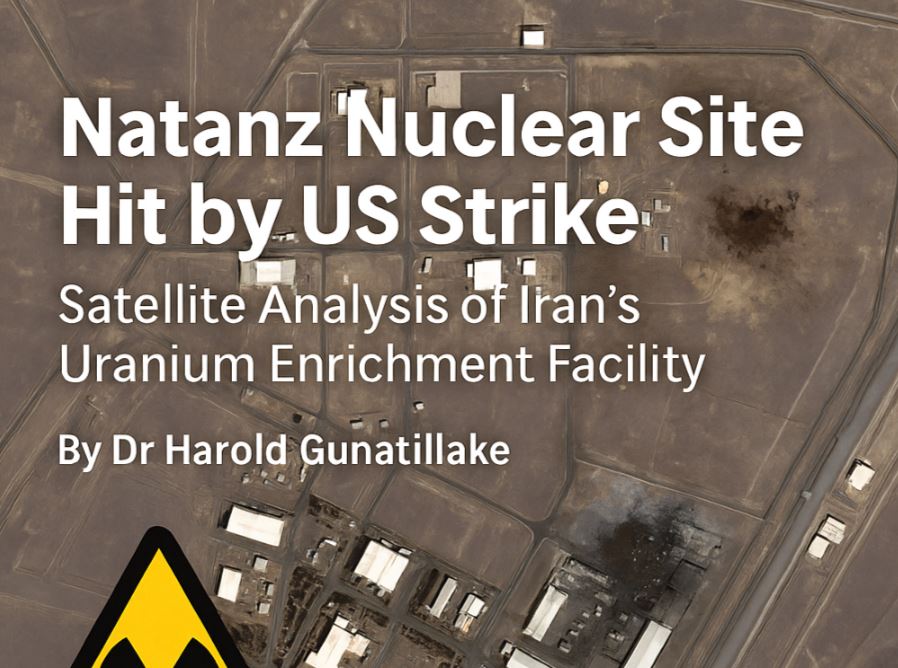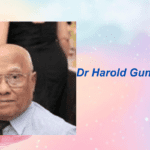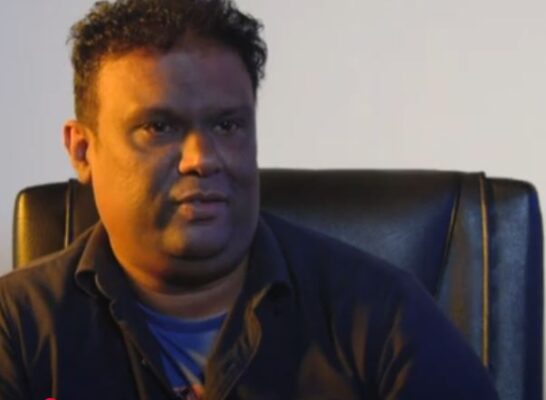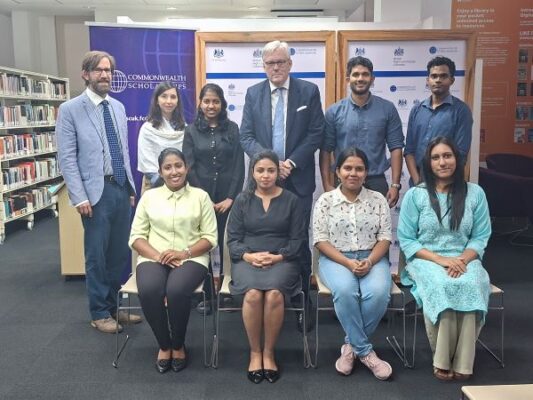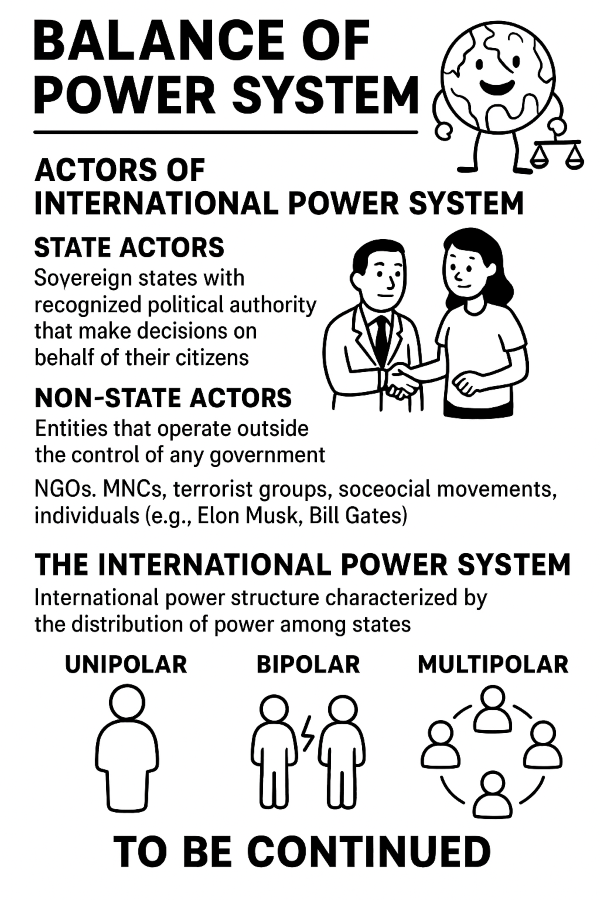Natanz Nuclear Site Hit by US Strike: Satellite Analysis of Iran’s Uranium Enrichment Facility – BY DR HAROLD GUNATILLAKE

Uranium enrichment is a crucial process in the production of fuel for nuclear power facilities. However, it also has the potential to be exploited in the fabrication of nuclear weapon materials. The dual-use nature of enrichment technology—the differentiation between civilian and military applications—makes it a subject of significant international attention and debate.
COLLECTED BY
DR HAROLD GUNATILLAKE OAM
FOR THE BENEFIT OF SRI LANKANS,
GLOBALLY
Dispute Over Uranium Enrichment Casts Shadow on Iran-U.S. Nuclear
Negotiations: An Analysis of Diplomatic
Tensions and Prospects for Peace.
The ongoing dispute concerning uranium enrichment between Iran and the United States persists in casting a significant influence over forthcoming nuclear discussions and broader peace negotiations. This disagreement transcends mere technical or procedural disagreements; it epitomises profound mistrust, historical grievances, and divergent strategic interests that have historically influenced the relationship between the two nations.
Uranium serves as the most extensively utilised fuel in nuclear power plants for nuclear fission processes. These facilities employ a specific isotope of uranium- U235- as fuel due to its susceptibility to fission. Although uranium is approximately 100 times more abundant than silver, U-235 constitutes a relatively small proportion of natural uranium, comprising just over.
Background to the Uranium Enrichment Dispute
Uranium enrichment is a crucial process for producing fuel used in nuclear power plants. Nevertheless, it also possesses the potential to be exploited for the development of nuclear weapon materials. The dual-use characteristic of enrichment technology—the distinction between peaceful and military applications—renders it a focal point of international scrutiny and controversy.
Iran’s nuclear program has consistently been at the forefront of global attention, with numerous Western nations, led by the United States, voicing concerns that Iran may attempt to develop nuclear weapons under the pretence of a civilian nuclear program.
Throughout the years, Iran has insisted that its nuclear aspirations are solely peaceful, targeting electricity generation and the advancement of medical research. Despite this, suspicions continue to be reinforced by Iran’s historical secrecy and the international inspectors’ discovery of undeclared nuclear facilities.
Iran suspends co-operation with UN nuclear watchdog.
No, independent anti-nuclear organisations have not conducted inspections of Iran’s uranium nuclear sites. The International Atomic Energy Agency (IAEA) is the sole international body authorised to monitor Iran’s nuclear program and carry out inspections. Although the IAEA has faced access restrictions and limitations, especially since 2018, it remains the leading organisation responsible for verifying Iran’s compliance with its international commitments.
Diplomatic Overtures and the Shadow of Hostility
In recent developments, Iranian Foreign Minister Abbas Araghchi has stated that his country remains open to diplomatic engagement, provided that the United States offers meaningful assurances, most notably, a promise not to embark upon renewed attacks or aggressive actions. This conditional openness underscores Iran’s desire for security guarantees as a prerequisite for returning to the negotiating table.
At the same time, Iran has made clear that it is determined to continue its uranium enrichment activities. For Iranian leaders, enrichment capability represents not only a matter of national pride but also a symbol of sovereign rights under the Treaty on the Non-Proliferation of Nuclear Weapons (NPT), which allows signatories to pursue nuclear technology for peaceful purposes.
On the other hand, the United States, wary of Iran’s intentions and the potential for a regional arms race, has insisted that it will not allow Iran to proceed with its enrichment program at levels it deems unacceptable. The United States, along with its European allies, argues that Iran’s enrichment activities must be strictly limited and verifiable to prevent any possibility of weaponisation.
The Legacy of the Joint Comprehensive Plan of Action (JCPOA)
The current state of affairs cannot be fully comprehended without reference to the Joint Comprehensive Plan of Action (JCPOA), commonly known as the Iran nuclear deal, which was concluded in 2015.
The JCPOA constituted an agreement between Iran and the P5+1 (comprising the United States, United Kingdom, France, Russia, China, and Germany), devised to restrict Iran’s nuclear activities in exchange for alleviation from economic sanctions.
The United States has imposed an arms embargo and an almost total economic embargo on Iran, which includes sanctions on companies doing business with Iran, a ban on all Iranian-origin imports, sanctions on Iranian financial institutions, and a near-total ban on selling aircraft or repair parts to Iranian aviation.
Under the terms of the JCPOA, Iran consented to limit its uranium enrichment to 3.67% purity—a level appropriate for civil nuclear power but significantly below weapons-grade—and to diminish its stockpiles of enriched uranium. The agreement additionally established stringent inspection protocols overseen by the International Atomic Energy Agency (IAEA).
Nonetheless, in 2018, the United States unilaterally withdrew from the JCPOA during the administration of President Donald Trump, citing concerns that the agreement was insufficient in preventing Iran from ultimately acquiring nuclear weapons. Subsequently, the U.S. reinstated severe economic sanctions on Iran, leading Tehran to withdraw from its commitments under the agreement gradually.
Escalation and Stalemate
Following the United States’ withdrawal from the Joint Comprehensive Plan of Action (JCPOA), tensions between the two nations escalated significantly, culminating in instances of military confrontation, assaults on oil infrastructure within the Persian Gulf region, and the targeted assassination of prominent Iranian officials.
In response to renewed pressure from the United States, Iran commenced uranium enrichment at levels exceeding the limits stipulated by the JCPOA. It substantially increased its stockpile beyond the agreed-upon thresholds.
The United States has maintained that Iran must resume full compliance with the JCPOA before any consideration of sanctions relief can be given. Conversely, Iran contends that the United States should lift sanctions before it ceases its nuclear escalation actions. This deadlock has resulted in the stagnation of the diplomatic process, with both parties awaiting the other’s initiative.
The Role of Regional and International Actors
The dispute concerning uranium enrichment extends beyond Iran and the United States, bearing considerable repercussions for the broader Middle East region and the international community at large. Regional adversaries such as Israel and Saudi Arabia perceive Iran’s nuclear program as an existential threat and have actively lobbied the United States and Europe to uphold a stringent stance.
Concurrently, European parties to the JCPOA have endeavoured to safeguard the agreement by establishing alternative financial mechanisms to circumvent United States sanctions and to motivate Iran to fulfil its commitments. Russia and China, both signatories to the JCPOA, have expressed support for Iran’s right to pursue peaceful nuclear technology, while also advocating for restraint and strict adherence to international accords.
Prospects for Future Negotiations and Peace
The current deadlock highlights the formidable challenges that any renewed negotiation process will face. For Iran, national dignity and resistance to foreign pressure serve as compelling motivators. The government, grappling with domestic economic difficulties and widespread unrest, is unlikely to accept concessions that are perceived as a relinquishment of sovereign rights.
For the United States, bipartisan scepticism regarding Iran’s intentions entails that any agreement will necessitate comprehensive verification measures and overt limitations on enrichment levels and nuclear stockpiles. The political climate in Washington remains cautious about engagement unless Iran demonstrates significant restraint.
Despite these impediments, both parties have indicated that diplomatic efforts are not entirely dismissed. Iranian Foreign Minister Abbas Araghchi’s remarks about openness to negotiations—conditional on U.S. commitments against renewed hostilities—imply a restricted opportunity for trust-building initiatives. Small, incremental steps, such as humanitarian aid, prisoner exchanges, or reciprocal de-escalation gestures, could facilitate the development of necessary trust for more meaningful negotiations.
The Stakes of the Enrichment Dispute
The consequences of failure are considerable. Absent a diplomatic resolution, the threat of military confrontation persists, with potential spillover effects throughout the unstable Middle East.
An unregulated Iranian nuclear program could instigate an arms race in the region, with neighbouring states pursuing nuclear capabilities to counterbalance Tehran.
Simultaneously, ongoing economic sanctions and isolation exacerbate hardships for ordinary Iranians, fostering anti-Western sentiment and hindering prospects for domestic reform. The broader international system is facing a critical test regarding the efficacy of nonproliferation norms and the commitment of major powers to uphold international agreements amid geopolitical rivalry.
Conclusion
The conflict concerning uranium enrichment between Iran and the United States exemplifies a broader struggle encompassing issues of security, sovereignty, and mutual trust. Although technical measures—such as imposing restrictions on enrichment levels, implementing intrusive inspection procedures, and phasing sanctions relief—are available, the political resolve to undertake compromises remains lacking.
Currently, the spectre of the enrichment conflict continues to overshadow forthcoming nuclear negotiations and efforts aimed at establishing enduring peace. Only through continuous dialogue, innovative diplomacy, and a mutual respect for security apprehensions can the present deadlock be resolved, thereby alleviating the threat of nuclear proliferation from imminent horizons.
The fact-finding mission mandated by the United Nations stated that some of Israel’s strikes on Iran may have violated international humanitarian law, citing the killing of civilians in an apartment block and three aid workers in Tehran. (REUTERS)



